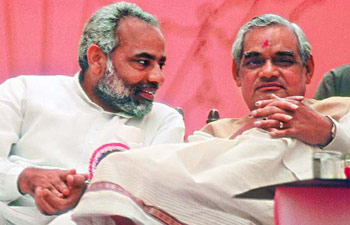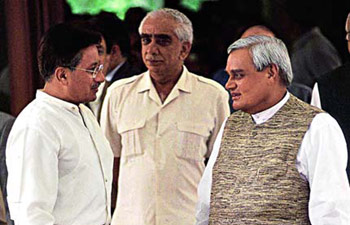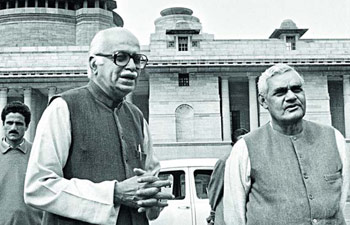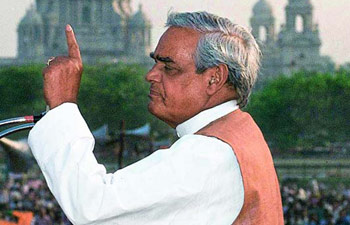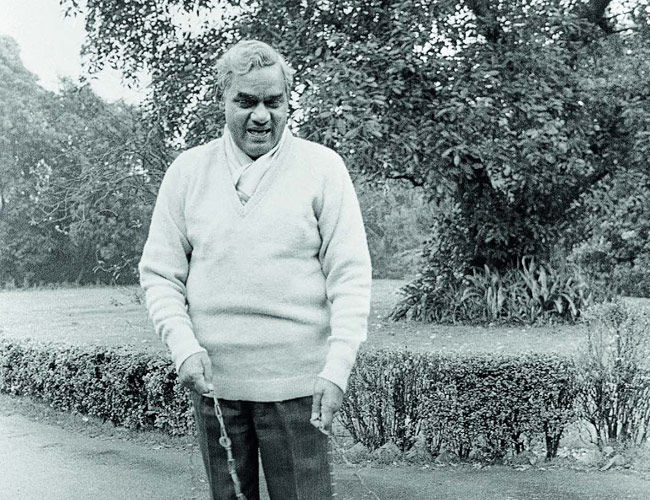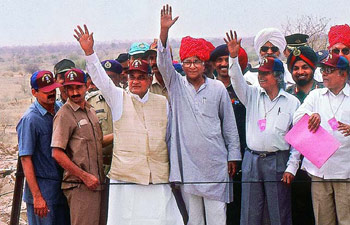Atal Bihari Vajpayee
This is a collection of articles archived for the excellence of their content. |
Contents |
Essential facts
15 things one should know about Atal Bihari Vajpayee
The Times of India (With inputs from agencies)
1. Atal Bihari Vajpayee was born on December 25, 1924 in Gwalior.
2. As a teenager, Vajpayee was jailed briefly for opposing British colonial rule. He flirted with communism before choosing to support the Rashtriya Swamyam sevak Sangh (R.S.S.) and the Jan Sangh.
3. Vajpayee dropped out of law school to run an R.S.S. magazine in the early 1950s. Later, he transcended his political roots in the R.S.S. to emerge as the moderate voice of the BJP.
4. His involvement in politics began as a freedom-fighter during the Quit India Movement of 1942-1945. He started out as a communist but shed that for membership in the Rashtriya Swayam sevak Sangh (R.S.S.), an organization propounding Hindutva, or Hindu Nationalism and considered Right-Wing in Indian politics.
5. Vajpayee became a close follower and aide to Shyama Prasad Mookerjee, founder of the Bharatiya Jana Sangh (BJS), BJP's predecessor.
6. Vajpayee was at Mookerjee's side when he went on a fast-unto-death in Kashmir in 1953, to protest against the system of carrying a permit for entering the state and the "inferior" treatment of Indian citizens visiting Kashmir, as also the special treatment accorded to Kashmir because it had a Muslim majority. Mookerjee's fast and protest ended the identity card requirement, and hastened the integration of Kashmir into the Indian Union. But Mookherjee died after weeks of weakness, illness and confinement in jail. These events were a watershed moment for the young Vajpayee.
7. Taking the baton from Mookerjee, Vajpayee won his first election to Parliament in 1957.
8. Vajpayee served the Lok Sabha, the lower house of parliament, for 10 terms that began in 1957 and concluded in 2009.
9. Vajpayee was the first head of government from outside the Congress party to serve a full five-year term.
10. Vajpayee first became Prime Minister in 1996 after four decades in opposition. He lasted only 13 days as prime minister for lack of numbers.
11. The lack of a stable majority ended his second stint in power from 1998 after 13 months. His government collapsed after AIADMK supremo J Jayalalithaa withdrew her support from the coalition.
12. Vajpayee was reelected in 1999 at the head of a more stable coalition that lasted its full term.
13. An orator par excellence, Vajpayee had earned much fame as India's external affairs minister in Prime Minister Morarji Desai government during which tenure he delivered a widely acclaimed speech to the United Nations General Assembly in Hindi.
14. Undeterred by party hawks who accused him of embarking on a misdirected visit to Pakistan in 1999, Vajpayee rode triumphantly into Lahore aboard a bus, on an initiative that was pursued by his successor Manmohan Singh.
15. A bachelor, Vajpayee is also a poet of some repute and he is often quoted by his party.
A life in history, briefly

From: Swapan Dasgupta, August 17, 2018: The Times of India

From: August 17, 2018: The Times of India
See graphics:
Atal Bihari Vajpayee: a timeline
Atal Bihari Vajpayee- some famous statements
A peek into the life Atal Bihari Vajpayee now leads
Akshaya Mukul,TNN | Mar 26, 2014 The Times of India
(This article was written when the UPA headed by Prime Minister Dr. Manmohan Singh was in power
A better part of Vajpayee's day is spent with physiotherapists, doctors and nurses.
2014 Less than a five-minute drive from the Ashoka Road headquarters of BJP, where the old guard is losing ground to the new, Atal Bihari Vajpayee sits quietly in a wheelchair in his SPG-guarded Krishna Menon Marg bungalow watching snatches of television and reading newspaper headlines.
The master orator, who was silenced by a stroke in 2009, cannot grasp either the small print or the big picture of what's happening within the party he nurtured. The three-time Prime Minister — last between 1999 and 2004 — bid adieu to active politics almost a decade ago. Now, as Modi — whom he'd wanted removed as Gujarat chief minister after the Godhra riots of 2002 — tightens his hold over BJP, some of his close friends and followers are feeling slighted or pushed to the wall.
Unlike the good old days, no one comes calling on him with complaints about the party or to listen to his poetry. The only regular visitors are N M Ghatate, Vajpayee's friend of nearly six decades, L K Advani and B C Khanduri (the general-turned-politician who was chief minister of Uttarakhand), who come to sit by his side or ask daughter Namita about his health.
Ghatate who visits him almost every week, sometimes even twice, says, "Prime Minister Manmohan Singh makes regular inquiries about his health and never misses wishing Vajpayeeji personally on his birthday." The two, Ghatate says, have an old association. Ghatate remembers how then PM PV Narasimha Rao called Vajpayee to complain that his finance minister Manmohan Singh had taken criticism of his budget by the opposition to heart and had offered to resign.
During a career spent mostly in opposition, Vajpayee had criticized everyone, from Nehru to his daughter Indira, but never realized it could hurt someone so much. Ghatate says Vajpayee immediately called Singh and told him not to take such comments to heart as they were meant to score political points. The Rao government was saved an embarrassment, and a new friendship was forged.
Ghatate says Vajpayee is still mentally alert. "But the stroke he suffered does not let him speak." Till then, he'd kept himself busy with books and writing. Within two months of the 2004 electoral defeat, he wrote a four-page article on the successful NDA coalition experiment and how even Congress had to fall in line; he argued that coalitions were here to stay.
A better part of Vajpayee's day, Ghatate says, is spent with physiotherapists, doctors and nurses. "I go there and just watch him or talk to family members. He understands everything but cannot have a conversation," he says. Vajpayee's favourite food — Chinese and prawns — is now served only in small portions.
Advani, who was deputy PM in the last NDA government, is reported to have wistfully told some people that Vajpayee would consult him on "everything". When asked if BJP leaders still asked him for advice, he is believed to have replied, cryptically, "When they need to."
For Ghatate, who first met him in the 1950s, the sight of the silent statesman is heart-rending. Vajpayee, who had known Ghatate's father, Babasaheb Ghatate, a senior Hindu Mahasabha leader, took the young law student under his wing in Delhi and treated him like a younger brother.
Of all the things that the protracted illness has taken away, Ghatate misses Vajpayee's sense of humour the most. When Ghatate gave him the news of the death of JN Dixit, Manmohan Singh's first national security advisor, Vajpayee said, "He was a good man. His problem was he used to work hard and worry a lot about the consequences." Ghatate pointed out Vajpayee's NSA and Dixit's predecessor Brajesh Mishra was also hard working, to which Vajpayee retorted with a mischievous smile, "Yes, Brajesh too was hard working, but then I had to worry about the consequences," Ghatate recounted this to Mishra and the two had a good laugh.
Ghatate has been busy compiling Vajpayee's jokes and witticisms into a book. He has so far collected about 80; he knows there are many more out there.
A timeline
Atal Bihari Vajpayee, poet and politician: a timeline
According to The Hindu's archives, former Prime Minister Atal Bihari Vajpayee was was a firm believer in secularism. He was fond of repeating that Hinduism was not a religion but a secular way of life.
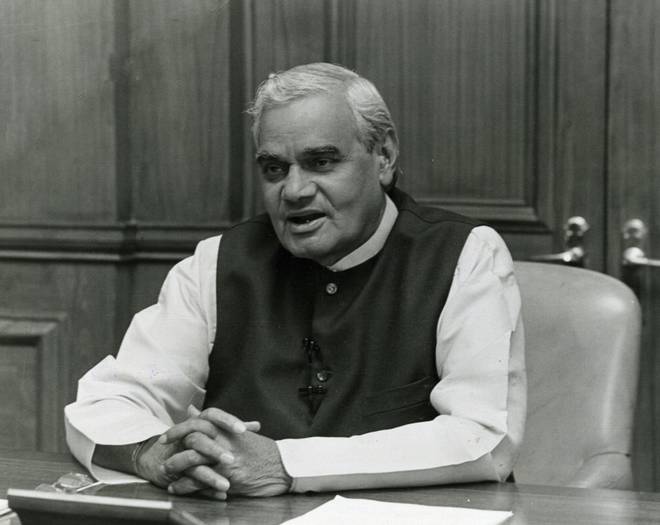
From: The Hindu Net Desk, Atal Bihari Vajpayee, poet and politician: a timeline, August 17, 2018: The Hindu
Former Prime Minister Atal Bihari Vajpayee, who passed away today at the All India Institute of Medical Sciences, was a skilled orator and politician. We bring to you a timeline based on The Hindu's archives, documenting his political life. According to The Hindu, Vajpayee was an "out and out a politician, with oratory as his forte. He can cast a spell on his audiences and to their delight, and with his biting sarcasm, demolish the case of his opponents. Compared to others, Mr. Vajpayee is liberal, flexible and open to conviction."
December 25, 1924: Atal Bihari Vajpayee born in Gwalior, Madhya Pradesh. Vajpayee had a brilliant career both at school and in the university with scholarships won on merit. He was a fluent speaker in English, inheriting the gift of the gab from his father Pandit K. B. Vajpayee. Father and son created history in the Lucknow University where they studied Law together.
1939: Member of the Rashtriya Swayamsewak Sangh (R S S), and after finishing his Masters in Political Science from Kanpur, he began to work full-time for the R S S in 1941
1942: During the 1942 Quit India movement, he gave up his studies to court imprisonment and later came back to win another scholarship to pursue his post-graduate studies. He had his political training under the late Dr. Shyama Prasad Mukerji. He was Dr. Mukerji's private secretary, and was with him when he died in a Kashmir jail. Before entering Parliament, Mr. Vajpayee was a journalist by profession and edited Rashtra Dharma and Veer Arjun.
1951: He was one of the founding members of the Jan Sangh, becoming its president in 1968 on the death of Deendayal Upadhyaya.
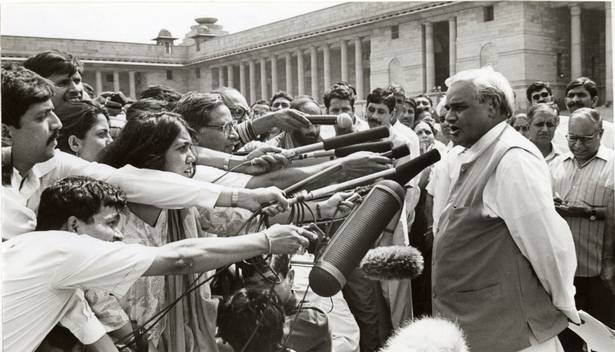
From: The Hindu Net Desk, Atal Bihari Vajpayee, poet and politician: a timeline, August 17, 2018: The Hindu
1957: Vajpayee was first elected to the Lok Sabha from Balrampur in Uttar Pradesh and was twice member of the Rajya Sabha.
1958: Vajpayee was imprisoned during the U.P. food agitation in 1958 and during the talks with Pakistan on Kutch in 1967.
June 13, 1964: As his parliamentary career flourished, Vajpayee made a name for himself as an orator and for his poetic flourishes. Vajpayee, as a member of the Jan Sangh, paid a glowing tribute to Jawaharlal Nehru, in the Rajya Sabha. He described Mr. Nehru as a thoroughly honest man and an idealist “who was never afraid to negotiate and never negotiated with fear”. Though he differed in his views from Mr. Nehru, he burst into tears both in the Upper House and in the all-parties meeting in the Central Hall while paying homage to Mr. Nehru in poetic and chaste Hindi.
According to The Hindu, Vajpayee was a firm believer in secularism. He was fond of repeating that "Hinduism was not a religion but a secular way of life," a report published in The Hindu on June 13, 1964 read.
1968: He became president of the party's new incarnation, the Bharatiya Jana Sangh from 1968 to 1973.
1974: He was arrested under the Maintenance of Internal Security Act (MISA) in Bihar.
1975: During the Emergency, the Bharatiya Jan Sangh along with several parties merged to form the Janata Party.
1977-79: In the Morarji Desai led Janata Party government, Vajpayee became the MEA.
1980: After the failure of the Janata experiment, the Bharatiya Janata Party was launched, and Vajpayee became its president. He remained the president of the party till 1986
1984: The newly founded BJP, after the dissolution of the Jan Sangh, won only two seats in the Parliamentary Elections.
December 6, 1992: Demolition of the Babri Masjid in Ayodhya. Vajpayee is on record as having said that he had warned L.K. Advani on the possible disastrous consequences of collecting a large crowd at the disputed site. Vajpayee was subsequently censured at an emergency meeting of the party's national executive committee for having gone beyond the R S S brief in expressing regret over the demolition of the Masjid.
1992: Vajpayee awarded the Padma Vibhushan award.
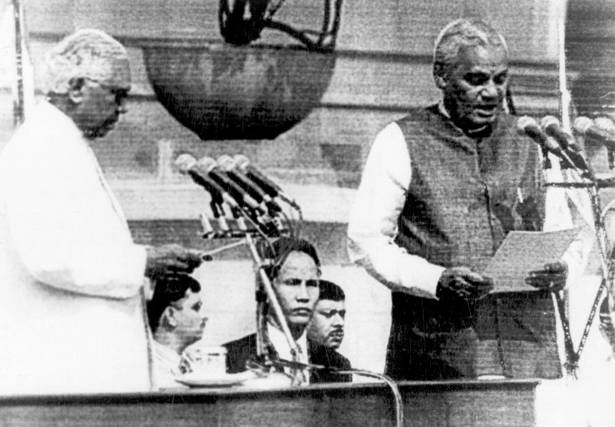
Photo Credit- The Hindu Archives
From: The Hindu Net Desk, Atal Bihari Vajpayee, poet and politician: a timeline, August 17, 2018: The Hindu
1995: As the BJP threw its weight behind the Ram Janmabhoomi movement, he emerged as the prime ministerial candidate on behalf of the BJP.
1996: He became Prime Minister, leading a 13-day government as head of the single largest party.
1998-99: Vajpayee was Prime Minister with the NDA government after a United Front government fell when the Congress withdrew support. He oversaw the Pokhran nuclear test and the subsequent international sanctions that went with it. The term was also marked by his initiatives for peace with Pakistan and the Lahore declaration. His 13-month government, however, could not withstand the rather fragile coalition that he had put together, and with the AIADMK withdrawing support, his government fell.
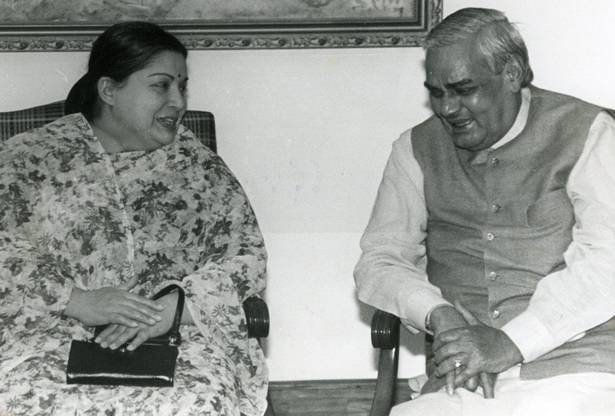
From: The Hindu Net Desk, Atal Bihari Vajpayee, poet and politician: a timeline, August 17, 2018: The Hindu
1999: During Vajpayee's term, the Army conducted Operation Vijay to wrest territories along the Line of Control after the Pakistan Army undertook a covert operation to send its troops into Kargil that led to a limited conflict that Pakistan lost.
1999-2004: Appointed Prime Minister leading the NDA alliance with a comfortable majority and a government that lasted a full term till 2004, the first non-Congress government to do so. During his address to the nation following the election, he said: "We are all guided by the lofty principles of secularism, social justice, social, harmony and women's empowerment. Ours is a Government wedded to a common ideal: to create a kinder, gentler and more tolerant society, free from all discrimination, fear and insecurity.”
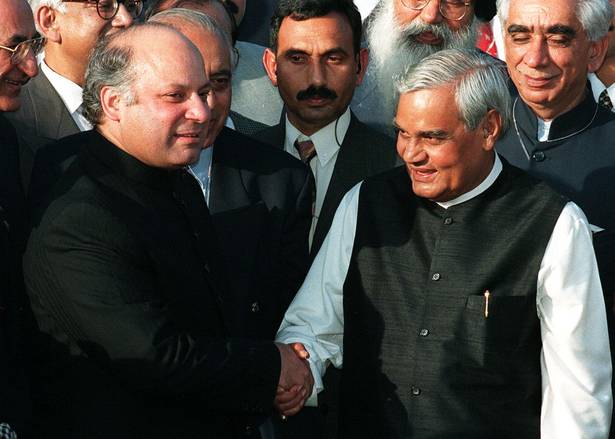
Photo Credit: The Hindu Archives
From: The Hindu Net Desk, Atal Bihari Vajpayee, poet and politician: a timeline, August 17, 2018: The Hindu
February 20, 1999: Inauguration of the Delhi-Lahore bus service. Television cameras captured the historic and stirring images of Prime Minister Vajpayee and his entourage getting into a bus and driving into Pakistan, to be greeted warmly by a Pakistani Prime Minister Nawaz Sharif at the border. On February 21, the Lahore Declaration was signed by the two Prime Ministers.
1999: During Vajpayee’s term, the Pakistan Army undertook a covert operation to send its troops into Kargil. US President Bill Clinton pushed Nawaz Sharif into withdrawing Pakistani troops from Kargil after a meeting in Washington. The Kargil War, also known as Operation Vijay, which was won by India, was a defining moment of Vajpayee’s tenure.
December 13, 2001: Parliament is attacked during his third term as Prime Minister. Subsequently, the NDA government brought in the controversial Prevention of Terrorism Act (POTA).
2004: Still attended Lok Sabha after his government’s defeat in the polls but gradually withdrew from public life.
2009: Vajpayee suffered a stroke that weakened his cognitive abilities.
2015: Vajpayee awarded the Bharat Ratna.
August 16, 2018: Atal Bihari Vajpayee passes away, age 93, after battling ill health for years.
Vignettes
August 17, 2018: The Times of India
KHICHDI ON THE MENU
In the early 1950s, when Vajpayee and Advani were trying to make their mark in Delhi, the two shared a room. Vajpayee is said to have done the cooking, and Advani has complained good-naturedly about the amount of khichdi he had to eat.
WHILE IN PRISON...
Vajpayee loved his food and cooking, and was “head cook” for the other political prisoners when he was in Chandigarh jail during the Emergency. He’s said to have enjoyed khichdi, kheer, malpuas and bhang.
FRIENDS ARE FOREVER
When someone asked him why he had a photograph of PV Narasimha Rao in his house long after the former PM had fallen out of favour with everyone, Vajpayee is said to have replied, “I don’t change my friends according to political fortunes.”
LIKE SON, LIKE DAD
Vajpayee enrolled in DAV College Kanpur to study law, and his father Krishna Bihari, a teacher who’d always wanted to be a lawyer, joined him. Father and son were reportedly in the same class and shared a room in the hostel. Students from the time recall the father and son cooking together in the evening, again khichdi and sweets.
THANKS TO COLUMBUS
Vajpayee’s toast to Clinton at the White House dinner on Sept 17, 2000 was: “I owe my presence here today principally to two persons, widely separated in time and also in space. One was the explorer, Christopher Columbus, who set sail for India but landed in America. I sometimes wonder where you would be, or where we would be, if he had actually reached India.”
LIGHT READING
The former PM enjoyed popular novels from Agatha Christie to John Grisham. Former US President Bill Clinton joked about Vajpayee’s penchant for Grisham when he visited the US: “I’m told PM Vajpayee, when he’s not writing poetry, likes to read John Grisham. You may be interested to note, Mr PM, that he’s a distant relative. All Grishams with money are distant relatives.”
MOVIE NIGHTS
Avid movie buffs Vajpayee and Advani watched many films together. After they became PM and deputy PM respectively, they watched special screenings, including most of Shah Rukh’s films and Hrithik Roshan’s Koi Mil Gaya.
Vignettes II
August 17, 2018: The Times of India
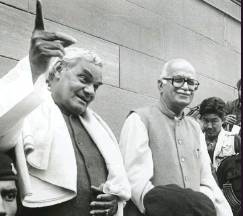
From: August 17, 2018: The Times of India
TRAVEL TALES
READY FOR A RIDE
Friends say Vajpayee loved to travel. On holiday in the US in the 1990s, friends recall the child-like enthusiasm with which he queued up for each ride at Disneyland, made trips to Niagara Falls and the Grand Canyon, watched Broadway shows, and enjoyed Mexican food. He was known to wander the streets of New York City dressed in trousers and an old shirt, and buy ice cream cones for his security entourage
GOURMET FOR LIFE
APPETITE FOR FUN
Just before a visit to China when he was external affairs minister in the Janata government, Vajpayee fell ill. In a meeting with journalists before he left, one of them asked how he was feeling. Vajpayee’s reply: “ Chinese food khane ke liye badhiya (All set to eat Chinese food)”
YOUNG AT HEART
EAR FOR STUDENTS
In 1977, Morarji Desai made a trip to the then USSR during which he scolded Indian students there for drinking. They tried explaining that they drank to keep themselves warm, but Desai was in no mood to listen. On the way out of the room, though, Vajpayee winked and whispered to them, “ Piyo, piyo (drink, drink)
SHAH RUKH SAYS
King Khan has always been apolitical but he’s often spoken fondly of Vajpayee. SRK has said that when he was a child his father used to take him to INA Market in Delhi to make him hear Vajpayee’s speeches as his dad felt Vajpayee had excellent command over Hindi and that SRK could learn from him
A profile
The BJP's first truly mass leader is officially etched as a national symbol, making him a role model for India's right-wing and beyond
Ravish Tiwari December 25, 2014
Thanksgiving is not a tradition on the Indian calendar. And it is unlikely the thought would have crossed the mind of the powers that be in NDA 2 who went through with the not-unexpected decision to confer the Bharat Ratna on Atal Bihari Vajpayee-former prime minister, poet, patriarch and a political pioneer like few others. Call it coincidence, or the articulation of a subconscious thought, but there is little doubt that NDA 2 owes a huge debt of gratitude to the man who was not just the architect of NDA 1 but also the moderate face of India's right wing politics.
A face, thought and expression- through lucid prose, poetry and some very pregnant pauses-that helped build a mainstream right-wing political movement and made it acceptable to the masses. So much so that his six-year reign at the head of NDA 1, and the decades of struggle preceding that, is now seen as the foundation on which NDA 2, India's first genuinely right-wing government with a brute majority of its own, has been built. The timing, therefore, could not be more apt.
Vajpayee was not alone when the seeds of an alternative, Hindu nationalist political thought were being sown across India. Former Hindu Mahasabha leader Syama Prasad Mookerjee had quit Jawaharlal Nehru's cabinet to float the Jan Sangh had provided some of its finest men- Pandit Deendayal Upadhyay, Nanaji Deshmukh, Jagannath Rao Joshi, Kushabhau Thakre and Sunder Singh Bhandari, among others-to help this political alternative grow roots. Vajpayee and L.K. Advani were the electoral faces identified to push the movement.
The Jan Sangh mutated into the Janata Party before reclaiming itself as the BJP, struggled to cope with the untimely deaths of Mookerjee and Upadhyay and the fact that others such as Deshmukh, Joshi, Thakre and Bhandari had little appeal beyond their own party. Enter Vajpayee, the powerful orator, moderate nationalist, bon vivant and relationship builder. The India of the 1980s and '90s, where political churn met economic flexibility and sought to discard socialist shibboleths was a platform that was made to order. Although Advani also climbed dizzying heights of popular appeal at the peak of the Ram Temple campaign, he will happily concede that his fellow traveller's mass appeal was more enduring. While the Hindu nationalist movement has a new icon in the form of Narendra Modi, it will take him some doing to overshadow or dislodge Vajpayee as the presiding deity. Debating against Nehru, supporting Indira Gandhi for the 1971 Bangaldesh war, opposing her imposition of Emergency, merging their carefully nurtured Jan Sangh into the Janata Party, floating the BJP, supporting V.P. Singh to dislodge Congress again and becoming the first BJP prime minister in 1996-Vajpayee has been the flagbearer at all key political milestones in post-Independence India. It's a feat that can be matched by few other anti-Congress icons.
Vajpayee's NDA with an alphabet soup of some two dozen parties is arguably India's best-run coalition government yet. It sought to unshackle the economy while trying to keep the saffron warriors at bay-a worthy role model for its successor. And that is perhaps where the irony also comes into play-a Modi trying to focus on governance and development while the Sangh snaps at his heels with its divisive agenda. The wheel comes a full circle. Not only is the Bharat Ratna a token of the subconscious gratitude, it is also a mark of recognition for the BJP's ideal role model.
Thus spake Atal Bihari Vajpayee
August 17, 2018: The Times of India
ATAL SPEAK
In an interview to TOI on Apr 12, 2004, ahead of Lok Sabha election which turned out to be his last shot at being PM, Vajpayee spoke on the need for moderation and dharma of coalitions
ON HINDUTVA
Hindutva and Bharatiyata have the same meaning. But I would prefer to say Bharatiyata. Hamare yahan (in BJP) Hindutva wale bhi hain (There are also among us the Hindutva people)
ON NEHRU
I did admire Nehru... his intellectual depth which had a blend of spirituality as well. The description of Ganga in his Discovery of India can only be the work of a mahakavi (great poet). But when comparisons are made (between him and Nehru), people forget that he wasn’t alone. There were many tall leaders
ON COALITION DHARMA
I don’t indulge in chalaki (cunning) with anyone. I don’t let people down. I don’t indulge in ustadgiri. All parties felt this man will stand by us We were convinced that to run such a big country a coalition will be necessary. And we shouldn’t let ideology get in the way. Strong regional traditions will feel they have a voice at the Centre. We’re definitely moving to a federal polity
ON BJP
BJP has always been open to experimentation. Circumstances have changed us, and, in turn, we have changed the circumstances. It is a two-way process
ON PAKISTAN
Peace, good relations with Pakistan, without compromising India’s interest, is a dream I have nurtured even before I became external affairs minister in 1977… I have faith in the insaniyat of people everywhere, including the people of Pakistan. There is the realisation that more war is neither a solution nor an option
ON ADVANI
People tend to assume that Advaniji is very hard… It is a 50-year-old relationship. Yes, sometimes there are differences in thoughts. Sometimes he has his way, sometimes I do.
The poet and the politician
Avijit Ghosh, August 17, 2018: The Times of India
How balancing poetry and politics wasn’t always easy
In the winter of 1988, a critically ailing A B Vajpayee was admitted to a New York hospital. From the hospital bed, he wrote a letter and a poem to the editor of Dharmyug, a famous Hindi magazine in its time.
‘Kavya ki kasauti par mera prayas bhale hi khara na utre, kintu yeh meri zindagi ka dastavez hai,’ wrote Vajpayee, roughly translated into English as “My effort may not stand up to the benchmark of poetry but it is my life’s document.”
The poem, where he wrote of his face-off with death, was published as ‘Zindagi Ka Dastavez’ in the magazine’s December 8 issue. Cryptically and philosophically, he wrote, ‘Maut ki umra kya / Do pal ki bhi nahin’ (What’s the lifespan of death/Not even a few moments).
Vajpayee penned hundreds of poems, compiled in collections such as ‘Meri Ekyavan Kavitayein’ (My 51 poems) and ‘Na Dainyam Na Palayanam’ (Neither Self-Pity Nor Escape). And they were translated into various languages, including Bulgarian. One of his poems, ‘Kya Khoya Kya Paaya’ was set to tune by ghazal singer Jagjit Singh. Shah Rukh Khan starred in the music video. In one his works of prose, ‘Atmakathya’ (My Story), he wrote he inherited the craft from his father, who was a well-known poet of Gwalior riyasat. Vajpayee was inspired by Tulsidas’s ‘Ramcharitmanas’, Jaishanker Prasad’s ‘Kamayani’, Suryakant Tripathi Nirala’s ‘Ram Ki Shakti Puja’ and Mahadevi Verma’s ‘Geet’.
Some of Vajpayee poems allude to Hindu mythology and history. One of them, ‘Parichay’ (Introduction), begins with the line: ‘Hindu, tan-man, Hindu jeevan, rag rag Hindu mera parichay’ (Body and soul Hindu, Hindu life, Hindu in my every vein, Hindu my introduction).
Along with themes of valour and nationalism, his works also touched upon existential themes and oppression, particularly by the state during the Emergency. Vajpayee accepted that balancing poetry and politics wasn’t easy and credited jail visits with keeping the poet in him alive. Some of his light-hearted but politically-aware verse were written in jail during Emergency, where he describes himself as ‘Qaidi Kavirai’ (Prisoner-poet).
Self-introspection found its way into his poetry. ‘Zindagi Ka Dastavez’, later published as ‘Maut Se Thhan Gayee’ (Face-Off With Death) is one such: ‘Tu dabe paon, chori-chhipe na aa/Saamne vaar kar, phir mujhe aazma. (Don’t come tiptoeing playing hide and seek/Attack me upfront, then test me). In the end, though, death tiptoed in quietly and slowly for Vajpayee.
The foodie
Sonam Joshi, Sashimi to puris, always a foodie, August 17, 2018: The Times of India
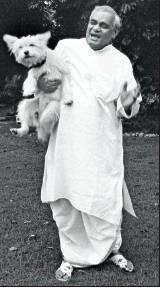
From: Sonam Joshi, Sashimi to puris, always a foodie, August 17, 2018: The Times of India
Former PM Vajpayee was quite adventurous when it came to trying new dishes and generous in his compliments, says chef Hemant Oberoi, who regularly accompanied Vajpayee on foreign trips.
Vajpayee’s eclectic eating habits set him apart from PMs that followed. “PM Manmohan Singh was a simple eater. Rarely would he eat non-vegetarian food, maybe just a bit of fish. The present PM is vegetarian,” says Oberoi. “PM Vajpayee would try different food.” On tour, he’d taste local cuisine like sashimi in Japan.
He had a soft spot for Amritsari-style fish and Kerala prawn curry, but his comfort food remained a staple from his home state of UP: Lucknowi-style puribhaji. “Even in Tokyo, he would request it for breakfast. Sometimes it was difficult to get atta for puris, but once we knew he liked it we started carrying it or the ambassador would provide for it,” says Oberoi.
When Vajpayee hosted lunch for then Pakistan President Pervez Musharraf at Delhi’s Taj Palace hotel in 2001, Oberoi was summoned to the table. Vajpayee gestured towards Musharraf who wasn’t eating. It was only when Oberoi assured Musharraf that the food was halal that he ate.
Vajpayee was liberal with praise, sending chefs letters of appreciation. Oberoi recalls receiving an autographed copy of a photograph with Vajpayee that was taken during a flight from New York to Washington DC.
His legacy
Shekhar Gupta
March 26, 2015
The man who got it right: Poet, pragmatist, always political
Atal Bihari Vajpayee's greatest, durable legacy is to show that India is best governed with a large heart
Shekhar Gupta
The Narendra Modi government has given us the perfect reason to do so by honouring Atal Bihari Vajpayee with the Bharat Ratna. One key assessment for a full-term prime minister, particularly a popularly elected one, would be how much of what he willed, began and believed in survive his departure. On that, Vajpayee scores very well indeed.
There's been broad continuity in the direction of India's economic and foreign policy. A leader, therefore, can only change the pace and width. But this isn't a big, substantive change in mindsets, a big idea that challenges ossified ones and is established so firmly that it is unassailable to future depredations. Nehru's liberal pluralism is one such idea.
Even Modi has to swear by it, even if he prefers to do so in the name of Patel and Gandhi. His second contribution-a rational, questioning, secular society with scientific temper-has sustained so far. But it will be tested in the coming years as India's new politics probes an important fault line there: contradiction between his nearly godless view of secularism and a deeply god-fearing society.
The third one, socialism, Nehruvian or Fabian, has been fully demolished, notably for 15 years by Nehru's own party's governments (under P.V. Narasimha Rao, Manmohan Singh). Ditto for Indira Gandhi. Her idea of a powerful, no-nonsense India not shy of playing Great Power politics endures, and will be strengthened as the BJP reaches out to get in their creeping acquisition of Congress icons after Madan Mohan Malaviya, Sardar Patel, and now Lal Bahadur Shastri. Her aggressive equal-distribution-of-poverty in the name of Garibi Hatao is now dead and buried, and derided as povertarianism. If her party's score of 44 in 2014 is the coffin, legislations amending coal and mineral laws and states loosening labour regulations are the last nails in it.
Now the unusual suspect, Rao. The demolition of two of the three ideological pillars of the Nehru-Indira era, statist socialism and Westophobic worldview, began in his five years. He was a socialist but more a pragmatist. He was helped greatly by the seven-year eclipse of the Gandhi family, directly for five years through his prime ministership and for his new ideas through the Gowda-Gujral period, when a coalition backed by the Congress left its economy to P. Chidambaram, then of the breakaway Tamil Maanila Congress. No matter how deep the Congress may bury his name in their party history, Rao won that intellectual battle, and you can never take away from his five difficult years.
Vajpayee followed in his wake (after the short-lived United Front) to become the first non-Congress leader to get five, in fact six, years of prime ministership, with one hiccup when he was defeated in the Lok Sabha in 1999 and forced to fight yet another election, his third in three years. Both were veterans of Parliament and had a great deal of mutual respect and admiration between them. Vajpayee always saw Rao as an experienced, wise patriot, and did not have the same suspicions of him as of the Dynasty. Rao saw Vajpayee as an alter ego of sorts, in spite of such a contrast in their personalities. Remember, he sent him to Geneva as leader of the Indian delegation to counter a threatened UN Human Rights Commission vote against India, with Salman Khurshid, then MoS for external affairs, as his deputy. He never detested Vajpayee personally or ideologically. That "honour" was reserved for Advani. I, therefore, firmly believe the story that as Rao handed over to Vajpayee (although initially only for 13 days), he told him that he had kept all "saamagri" (material, nuclear) ready, and Vajpayee should go ahead and test once he had the mandate. The departure Rao bravely made from the Nehru-Indira construct on foreign and economic policies has sustained.
What exactly was Vajpayee's opportunity once the direction of foreign and economic policies was set? A liberal constitutionalist and a romantic, a bit like Nehru, and a poet too. Not gifted with the ruthlessness of an Indira, a Rao or now Modi, nor a visionary like Nehru. But he had a great, instinctive mind and a wonderfully warm and, more important, large heart. God never designed a man withall the key attributes of leadership. The greatest leaders in history have some and lack a few. But nobody ever did, or will, become a great leader in any field without a big heart. On that test, Vajpayee ranks very much at the top. We leave Manmohan Singh out of this as he really wasn't a fully empowered leader.
Nor was Vajpayee when sworn in prime minister for the first time in 1996 by virtue of being the leader of the largest single party/coalition. He knew he was going to fail his first test, the vote of confidence in Parliament within days, as all of the opposition was against him under the secular umbrella. But his mind was made up and his heart was ready to chalk the course that would ensure for him such a special place in our history.
It was two days before he was to speak in that debate that I got a call to see him in his old Raisina Road home, which he had not moved from, knowing his tenure was short. He was calm, determined, even smiling. "I believe you once wrote somewhere that the majority in India had acquired a minority complex?" he asked. I said yes; it was in a monograph I wrote for the International Institute of Strategic Studies, London (India Redefines its Role, OUP, 1995) while on a sabbatical from this magazine. He engaged in a short debate on why Hindus in India felt vulnerable, even persecuted, despite being in an overwhelming majority. He said he understood why, but did not fully agree with it. In any case, he said, he was elected prime minister not to feel sorry for the Hindus, but to lead them out of that hole and also reassure the minorities. He dwelt on that majority-getting-the-minority-complex idea in his emotional speech facing a confirmed defeat.
But in that defeat he had told India's Parliament and its people that he was different from the usual BJP stereotype. That trust ensured two things. One, that a lot more people, besides the BJP's committed voters, were willing to check him out now. And two, many smaller parties sitting on the secular fence found the reassurance to cross over to the NDA. Remember, Nitish, Mamata, Naveen Patnaik, even Omar Abdullah of the National Conference were in his councilof ministers.
In his six years, he established two new ideas in Indian politics. One, that the BJP could lead a centre-right government in India entirely within the classical framework of the Constitution, thereby confirming the idea that India would change BJP more than BJP change India. Two, that the doctrine of strategic restraint would hold, even under grave provocation, as in Kargil and the attack on Parliament. The gains were evident: the first established the sanctity of the LoC and the second globally confirmed Pakistan's status as a terror-exporting nation.
The second postulate will be tested in the coming years. But the first, the Vajpayee definition of Rajdharma for the BJP, has been established. If Modi now swears by Vajpayee rather than Golwalkar, the direction he set for the BJP, or the governing ideology of the Indian Right, will sustain. That will be his lasting contribution, and it is as formidable as Nehru's liberalism, Indira's strength and Rao's pragmatism. On that scale, Vajpayee will rank right up there. Never mind the irony of his being conferred the Bharat Ratna by Modi's government.
In 2014, not in good health
A peek into the life Atal Bihari Vajpayee now leads
Akshaya Mukul, March 26, 2014: The Times of India
(This article was written when the UPA headed by Prime Minister Dr. Manmohan Singh was in power)
A better part of Vajpayee's day is spent with physiotherapists, doctors and nurses.
2014 Less than a five-minute drive from the Ashoka Road headquarters of BJP, where the old guard is losing ground to the new, Atal Bihari Vajpayee sits quietly in a wheelchair in his SPG-guarded Krishna Menon Marg bungalow watching snatches of television and reading newspaper headlines.
The master orator, who was silenced by a stroke in 2009, cannot grasp either the small print or the big picture of what's happening within the party he nurtured. The three-time Prime Minister — last between 1999 and 2004 — bid adieu to active politics almost a decade ago. Now, as Modi — whom he'd wanted removed as Gujarat chief minister after the Godhra riots of 2002 — tightens his hold over BJP, some of his close friends and followers are feeling slighted or pushed to the wall.
Unlike the good old days, no one comes calling on him with complaints about the party or to listen to his poetry. The only regular visitors are N M Ghatate, Vajpayee's friend of nearly six decades, L K Advani and B C Khanduri (the general-turned-politician who was chief minister of Uttarakhand), who come to sit by his side or ask daughter Namita about his health. Ghatate who visits him almost every week, sometimes even twice, says, "Prime Minister Manmohan Singh makes regular inquiries about his health and never misses wishing Vajpayeeji personally on his birthday." The two, Ghatate says, have an old association. Ghatate remembers how then PM PV Narasimha Rao called Vajpayee to complain that his finance minister Manmohan Singh had taken criticism of his budget by the opposition to heart and had offered to resign.
During a career spent mostly in opposition, Vajpayee had criticized everyone, from Nehru to his daughter Indira, but never realized it could hurt someone so much. Ghatate says Vajpayee immediately called Singh and told him not to take such comments to heart as they were meant to score political points. The Rao government was saved an embarrassment, and a new friendship was forged.
Ghatate says Vajpayee is still mentally alert. "But the stroke he suffered does not let him speak." Till then, he'd kept himself busy with books and writing. Within two months of the 2004 electoral defeat, he wrote a four-page article on the successful NDA coalition experiment and how even Congress had to fall in line; he argued that coalitions were here to stay.
A better part of Vajpayee's day, Ghatate says, is spent with physiotherapists, doctors and nurses. "I go there and just watch him or talk to family members. He understands everything but cannot have a conversation," he says. Vajpayee's favourite food — Chinese and prawns — is now served only in small portions.
Advani, who was deputy PM in the last NDA government, is reported to have wistfully told some people that Vajpayee would consult him on "everything". When asked if BJP leaders still asked him for advice, he is believed to have replied, cryptically, "When they need to."
For Ghatate, who first met him in the 1950s, the sight of the silent statesman is heart-rending. Vajpayee, who had known Ghatate's father, Babasaheb Ghatate, a senior Hindu Mahasabha leader, took the young law student under his wing in Delhi and treated him like a younger brother.
Of all the things that the protracted illness has taken away, Ghatate misses Vajpayee's sense of humour the most. When Ghatate gave him the news of the death of JN Dixit, Manmohan Singh's first national security advisor, Vajpayee said, "He was a good man. His problem was he used to work hard and worry a lot about the consequences." Ghatate pointed out Vajpayee's NSA and Dixit's predecessor Brajesh Mishra was also hard working, to which Vajpayee retorted with a mischievous smile, "Yes, Brajesh too was hard working, but then I had to worry about the consequences," Ghatate recounted this to Mishra and the two had a good laugh.
Ghatate has been busy compiling Vajpayee's jokes and witticisms into a book. He has so far collected about 80; he knows there are many more out there.
